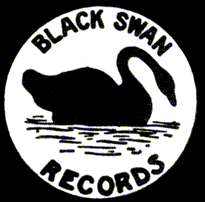
Black Swan Records was an American jazz and blues record label founded in 1921 in Harlem, New York. It was the first widely distributed label to be owned, operated, and marketed to African Americans. Founded by Harry Pace with W.C. Handy, Black Swan Records was established to give African Americans more creative liberties. Eighteen months earlier, in 1919, the Broome Special Phonograph Records was the earliest label owned and operated by African American George W. Broome in Medford, Massachusetts, featuring Black classical musicians including Harry T. Burleigh and Edward Boatner. Black Swan was revived in the 1990s for CD reissues of its historic jazz and blues recordings.

Zonophone was a record label founded in 1899 in Camden, New Jersey, by Frank Seaman. The Zonophone name was not that of the company but was applied to records and machines sold by Seaman's Universal Talking Machine Company from 1899 to 1903. The name was subsequently acquired by Columbia Records, the Victor Talking Machine Company, and finally the Gramophone Company/EMI Records. It has been used for a number of record publishing labels by these companies.
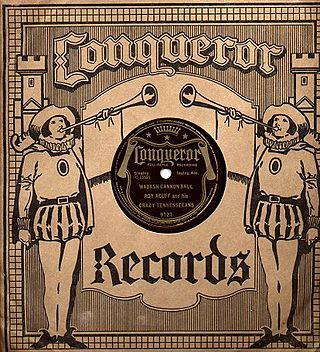
Conqueror Records was a United States–based record label, active from 1928 through 1942. The label was sold exclusively through Sears, Roebuck and Company.
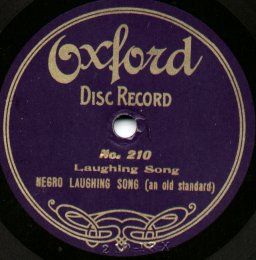
Oxford Records was a record label active in the United States of America from roughly 1906 until 1916. The label was produced for Sears by several labels, including Columbia and Albany Indestructible Cylinders for cylinders and Leeds & Catlin, Zon-O-Phone, and Columbia for discs. No recording activity was undertaken by Sears. All discs were single-sided.

Puritan Records was an American record label which lasted from 1917 to 1929. For most of its existence Puritan was a product of the Wisconsin Chair Company, which also marketed Paramount Records, but as a label, Puritan briefly predates Paramount and began with United Phonographs Corporation.
General Records was a small American record label during the late 1930s and early 1940s. Its most notable releases are piano solos recorded by Jelly Roll Morton in December 1939 late in his career.
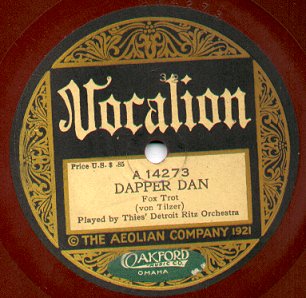
Vocalion Records is an American record label, originally founded by the Aeolian Company, a piano and organ manufacturer before being bought out by Brunswick in 1924.

American Record Corporation (ARC), also referred to as American Record Company, American Recording Corporation, or ARC Records, was an American record company in operation from 1929 to 1938, and again from 1978 to 1982.

Bluebird Records is an American record label best known for its low-cost releases, primarily of children's music, blues, jazz and swing in the 1930s and 1940s. Bluebird was founded in 1932 as a lower-priced subsidiary label of RCA Victor. Bluebird was noted for what came to be known as the "Bluebird sound", which influenced rhythm and blues and early rock and roll. It is currently owned by RCA Records parent company Sony Music Entertainment.
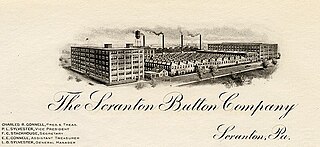
The Scranton Button Company was a U.S. corporation that was founded in Scranton, Pennsylvania, in 1885.
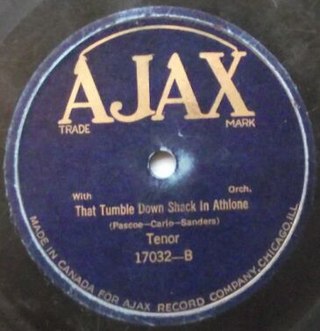
Ajax Records was a record company and label founded in 1921. Jazz and blues records were produced in New York City, with some in Montreal, and marketed via the Ajax Record Company of Chicago.

Challenge Records was a record label sold by the Sears-Roebuck Company. Releases were drawn from other recordings on other labels in the late 1920s, such as Banner, Gennett, Paramount Records and others. Sears also had the Silvertone label and the same recording of "Black Bottom" by Joe Candullo & his Everglades Orchestra was released on both labels. Around 1929 Sears did away with Challenge and Silvertone, replacing them with Conqueror Records. Challenge discs generally sold for less than Silvertone ones because they seldom used songs requiring royalty payments and the label generally assigned pseudonyms to the artists. Introduced in the Spring 1927 catalog for just 24¢ per disc, Challenge bore the frank disclaimer, "If you want the best, we recommend the Silvertone." The last issues appeared in Sears’ Spring 1931 catalog.
The Washboard Rhythm Kings, also known as the Washboard Rhythm Boys (1932), Georgia Washboard Stompers (1934-1935), Alabama Washboard Stompers (1930-1932), Washboard Rhythm Band (1932-1933), and Chicago Hot Five were a loose aggregation of jazz performers who recorded as a group for various labels between about 1930 and 1935. Bruce Johnson played washboard.

Franklyn Baur was a popular tenor vocal recording artist.

The Indestructible Record Company was an American record label that produced plastic cylinder records between 1907 and 1922.
Busy-Bee was a Chicago-based record label founded in 1904 that sold both cylinders and discs, often with content licensed from other labels. Their cylinders could only be played on special Busy-Bee players. A 1906 cylinder catalog shows artists including Gilmore's Band, Billy Murray, Arthur Collins, Bob Roberts, and Ada Jones.

Ammor Records was a short-lived American record label. It issued the first commercial recordings of Nat King Cole.
Miss Frankie was an American classic female blues singer. She recorded eight sides in 1926 and 1927.
Domino Records was a United States producer of early phonograph records. The company was originally named Empire Phonograph Corporation, but changed their name to Domino Phonograph Corporation in 1915, apparently before producing any products. The label debuted June 1916. They produced two-sided, 7-inch fine-groove vertical-cut disc records with a light-blue label and dark-blue lettering. Domino advertised their playing time as equal to that of a 10-inch disc. Playing time was actually around two-and-a-half minutes. The discs were marketed by two different companies; out of New York by the W.R. Anderson Company, and out of Dayton, Ohio, by the Thomas Manufacturing Company. Domino Records also made 7-inch pressings for other concerns, including Concert Records, Domestic Records, and Melodograph Records. In February 1917 a 10-inch red disc was introduced by Domino.
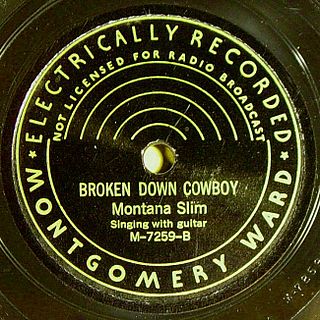
Montgomery Ward Records was American retailer Montgomery Ward's store brand record label. The records were sold at a lower than industry standard prices through company stores and catalogs. During its prolific run, the label issued many important country and jazz recordings.















